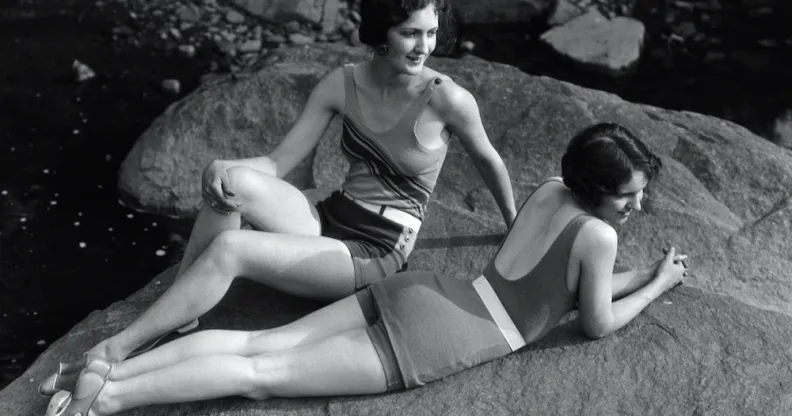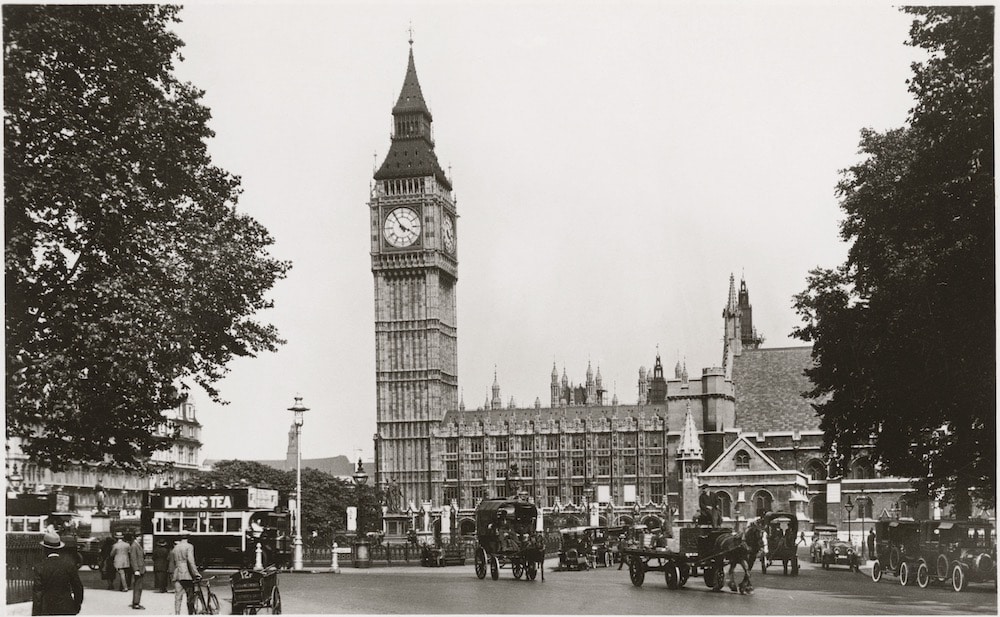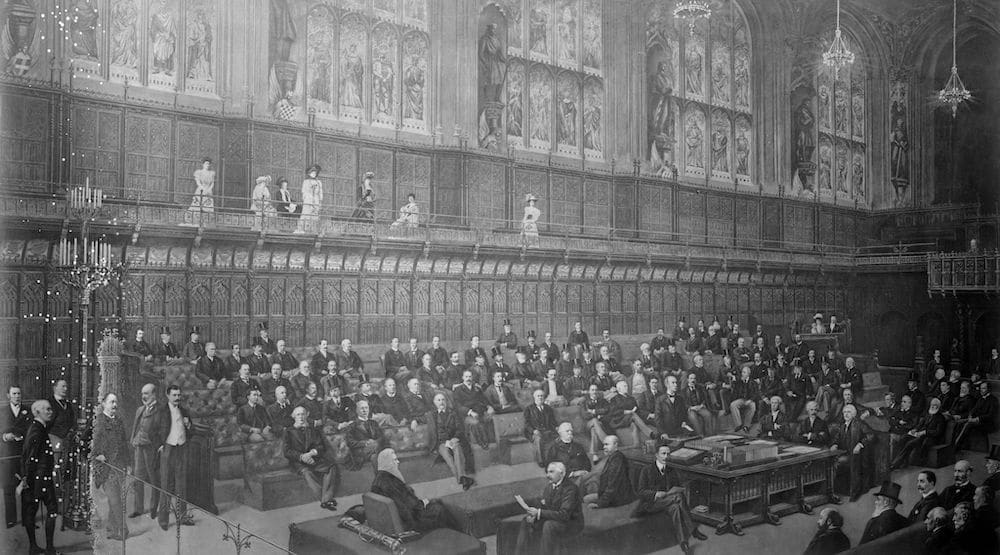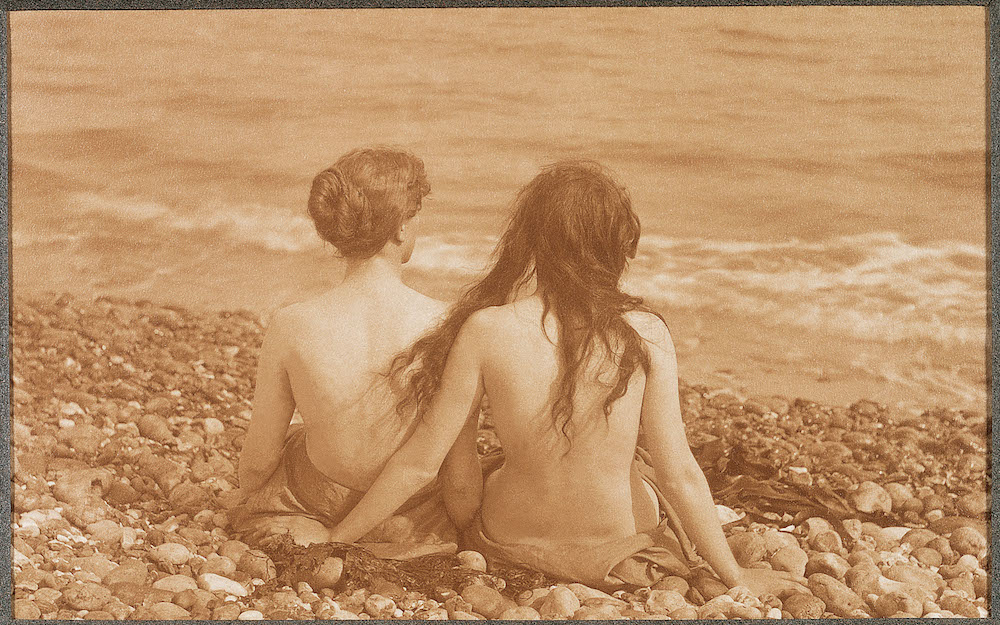Absurd but true story of the UK lesbianism ban that never was – and why terrified men scrapped it

Two women relaxing on a rock in the 1920s. (Getty)
Lesbianism was almost made illegal in 1920s Britain, but the reason lawmakers decided against a ban may surprise you.
In August 1921, the First World War had recently ended with rationing still being phased out, and Irish War of Independence ceasefire talks were ongoing. Unemployment was skyrocketing, women were demanding equal voting rights, and the year even saw a 100-day drought.
But what were MPs concentrating on? Trying to criminalise lesbianism, obviously.
In 1885, section 11 of the Criminal Law Amendment Act had made “gross indecency” between men illegal, punishable with at least two years in prison, with or without hard labour.
The Offences against the Person Act 1861 had also already criminalised “buggery” with no less than 10 years in prison, but the Criminal Law Amendment Act was vague, as “gross indecency” could be interpreted in a myriad of ways and applied to any act of intimacy. The law was used to convict both Oscar Wilde and Alan Turing, among many other men.
But by 1921, the government had realised there were quite a number of queer people they weren’t able to put in prison, and MPs introduced a bill which would have punished “gross indecency” between women.

Houses of Parliament and Big Ben in 1920s London. (Universal History Archive/Universal Images Group via Getty)
They suggested adding another clause to the Criminal Law Amendment Act, titled “acts of indecency by females”.
It read: “Any act of gross indecency between female persons shall be a misdemeanour, and punishable in the same manner as any such act committed by male persons under section 11 of the Criminal Law Amendment Act, 1885.”
The bill made it to the House of Lords, where it was promptly stuck down, but not for the reason you might think.
The Lords believed that if they made lesbianism illegal, they would simply create more lesbians, as feeble-minded women caught on to what, understandably, seemed like a great idea.

House of Lords inadvertently saved lesbians in 1921. (Getty/ Reinhold Thiele)
James Harris, the fifth Earl of Malmesbury, began the debate by apologising for a “discussion upon what must be, to all of us, a most disgusting and polluting subject”.
But, he insisted that however “disgusting” the subject matter was, “in passing a clause of this sort you are going to do a great deal more harm than good”.
He explained that criminalising lesbians would increase instances of blackmail against women, who he said liked to share beds as friends “for reasons of fear or nervousness, and the desire for mutual protection”.
At the same time, he added, it would also increase the number of lesbians.
“We all know that vice has been increasing partly owing to the nervous conditions following on the war, but I believe that these cases are best left to their own determination,” he told the House of Lords.
“I believe that all these unfortunate specimens of humanity exterminate themselves by the usual process, which we know has taken place in every nation through all the ages. The more you advertise vice by prohibiting it the more you will increase it.”

Only one in a thousand women knew about being gay, according to the House of Lords. (Getty)
Hamilton John Agmondesham Cuffe, the Earl of Desart, agreed.
He said: “I am strongly of opinion that the mere discussion of subjects of this sort tends, in the minds of unbalanced people, of whom there are many, to create the idea of an offence of which the enormous majority of them have never even heard.
Cuffe admitted that lesbians really did exist – I was going to say… I suppose I must not… that I know this does happen” – but continued that if a lesbian were to be prosecuted, “it would be made public to thousands of people that there was this offence; that there was such a horror”.
Alerting “hysterical” women, he said, to the existence of lesbianism would be a “great public danger” and “a very great mischief”.
Frederick Edwin Smith, Lord Chancellor and first Earl of Birkenhead, echoed Cuffe’s sentiment.
“The overwhelming majority of the women of this country have never heard of this thing at all, he said.
“I would be bold enough to say that of every 1,000 women, taken as a whole, 999 have never even heard a whisper of these practices.”
The Lords threw out the bill, and by avoiding the “great public danger” of more lesbians, accidentally ensured that generations of queer women could get on with the “disgusting and polluting” business of loving each other in relative peace.

